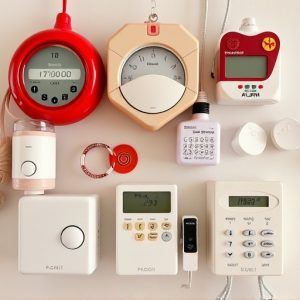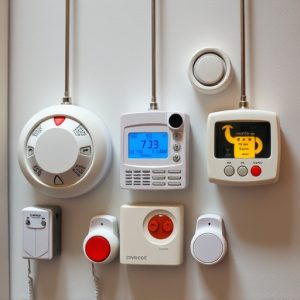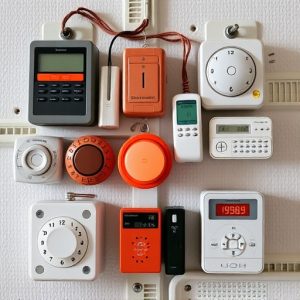Rechargeable vs Battery: Best Wearable Alarms for Senior Safety
Senior citizens' safety can be enhanced by wearable security alarms, with choices between recha…….
Senior citizens' safety can be enhanced by wearable security alarms, with choices between rechargeable and battery-powered models. Rechargeables offer sustained power ideal for home use, while batteries provide immediate setup and convenience for on-the-go situations. Both types feature advanced safety technologies like fall detection and easy operation, balancing technology with simplicity to ensure peace of mind. The decision should consider individual needs, environmental impact, cost, and initial setup time, with both options promising reliable security.
With an increasing elderly population, ensuring senior safety has become a paramount concern. Wearable security alarms offer a practical solution, providing peace of mind for both seniors and their caregivers. This article explores how these devices cater to unique senior safety needs, delving into the advantages of rechargeable vs battery-powered alarms. We’ll guide you through essential features, installation considerations, and maintenance tips, helping you navigate the market for the best wearable security alarm tailored to your loved one’s needs.
- Understanding Senior Safety Needs
- Rechargeable vs Battery-Powered Alarms: Comparison and Benefits
- Key Features to Consider in Wearable Security Alarms
- Installation, Maintenance, and Longevity: A Practical Look
Understanding Senior Safety Needs
Senior citizens have unique safety needs that require tailored solutions, and wearable security alarms offer a discrete yet powerful way to ensure their well-being. Understanding the specific challenges seniors face is crucial when considering personal alarms. For instance, mobility issues may limit their ability to reach traditional alarm controls, making portable, easy-to-use devices essential. These concerns highlight the importance of choosing between rechargeable and battery-powered personal alarms; both have advantages but cater to different lifestyles. Rechargeable options provide a constant power source, eliminating the need for frequent battery replacements, which is ideal for home use. On the other hand, battery-operated alarms are convenient for on-the-go scenarios, offering quick setup and operation without worrying about charging.
Personal alarms designed with senior safety in mind often incorporate features like fall detection, automatic alert systems, and easy-to-press buttons. Considering these needs, a balance between technology and simplicity is vital. Rechargeable or battery-powered, these personal alarms can be life-saving tools for seniors, offering peace of mind and rapid assistance when needed.
Rechargeable vs Battery-Powered Alarms: Comparison and Benefits
When considering wearable security alarms for seniors, one key distinction lies in the power source: rechargeable versus battery-powered. Both options have their merits, but understanding the differences can help seniors and their caregivers make an informed decision based on individual needs.
Battery-powered alarms are convenient and readily available, requiring no charging or maintenance beyond regular replacement. They offer immediate protection with fully functional batteries straight out of the box. On the other hand, rechargeable alarms promote sustainability and long-term cost savings by eliminating the need for frequent battery replacements. Rechargeable models also often feature longer lifespan and additional functionalities, such as longer alarm duration, water resistance, or integration with smartphone apps for remote monitoring.
Key Features to Consider in Wearable Security Alarms
When choosing a wearable security alarm for seniors, several key features stand out. One of the most important distinctions lies in power sources: rechargeable versus battery-powered personal alarms. Rechargeable options are increasingly popular due to their cost-effectiveness and environmental friendliness; these devices can be conveniently charged like smartphones. Battery-powered alarms, while sometimes more expensive, offer the advantage of never running out of power unexpectedly. They’re ideal for seniors who prefer a backup option or live in areas with limited access to charging outlets.
Additionally, look for alarms that are easy to operate, especially for those with reduced dexterity or vision. Simple button controls and loud, clear audible alerts are essential. Water resistance is another valuable feature, as it ensures the alarm’s longevity, particularly if the senior enjoys outdoor activities or lives in humid environments. Moreover, some models incorporate GPS tracking, fall detection sensors, or automatic emergency call features, providing added peace of mind for both seniors and their caregivers.
Installation, Maintenance, and Longevity: A Practical Look
When it comes to wearable security alarms for seniors, installation and maintenance are key aspects to consider. For a hassle-free setup, many modern devices offer simple clip-on designs that attach to clothing or bedding. These versatile personal alarms can be easily installed and removed daily, ensuring comfort and convenience for users. Regular maintenance involves replacing batteries or charging rechargeable units, which is typically straightforward and requires minimal effort.
Choosing between rechargeable vs battery-powered personal alarms is an essential decision. Rechargeable options are environmentally friendly and cost-effective in the long run, as they eliminate the need for frequent battery replacements. However, initial setup might require more time to ensure proper charging. On the other hand, traditional battery-powered alarms offer instant readiness but necessitate regular battery checks and replacements. Despite this trade-off, both types provide reliable security, ensuring seniors feel protected and assisted in case of emergencies.
Wearable security alarms offer a discrete yet powerful solution for senior safety, providing peace of mind both for the wearer and their loved ones. By understanding the unique needs of seniors and considering features like fall detection, long battery life, and easy-to-use interfaces, individuals can choose between rechargeable and battery-powered options to find the perfect fit. A well-selected wearable alarm can enhance independence while ensuring prompt assistance in case of emergencies, making it a valuable investment for senior care.


